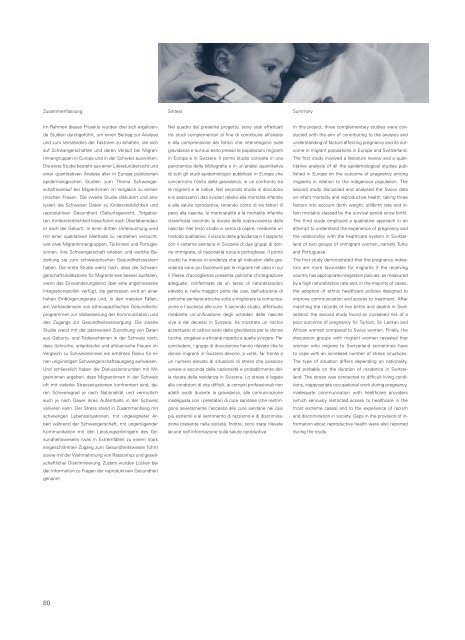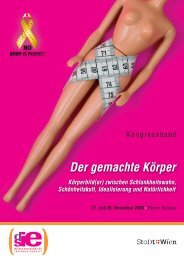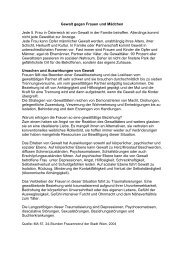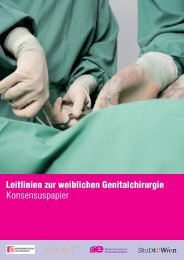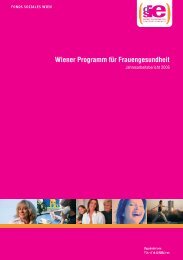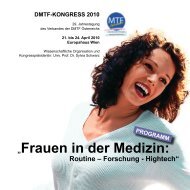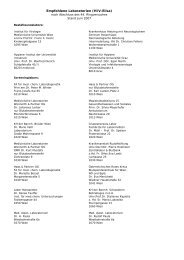Forschung Migration und Gesundheit im Rah - Bundesamt für ...
Forschung Migration und Gesundheit im Rah - Bundesamt für ...
Forschung Migration und Gesundheit im Rah - Bundesamt für ...
Create successful ePaper yourself
Turn your PDF publications into a flip-book with our unique Google optimized e-Paper software.
Zusammenfassung<br />
Im <strong>Rah</strong>men dieses Projekts wurden drei sich ergänzende<br />
Studien durchgeführt, um einen Beitrag zur Analyse<br />
<strong>und</strong> zum Verständnis der Faktoren zu erhalten, die sich<br />
auf Schwangerschaften <strong>und</strong> deren Verlauf bei Migrantinnengruppen<br />
in Europa <strong>und</strong> in der Schweiz auswirken.<br />
Die erste Studie besteht aus einer Literaturübersicht <strong>und</strong><br />
einer quantitativen Analyse aller in Europa publizierten<br />
epidemiologischen Studien zum Thema Schwangerschaftsverlauf<br />
bei Migrantinnen <strong>im</strong> Vergleich zu einhe<strong>im</strong>ischen<br />
Frauen. Die zweite Studie diskutiert <strong>und</strong> analysiert<br />
die Schweizer Daten zu Kindersterblichkeit <strong>und</strong><br />
reproduktiver Ges<strong>und</strong>heit (Geburtsgewicht, Totgeburten,<br />
Kindersterblichkeit klassifiziert nach Überlebensdauer<br />
nach der Geburt). In einer dritten Untersuchung wird<br />
mit einer qualitativen Methode zu verstehen versucht,<br />
wie zwei Migrantinnengruppen, Türkinnen <strong>und</strong> Portugiesinnen,<br />
ihre Schwangerschaft erleben <strong>und</strong> welche Beziehung<br />
sie zum schweizerischen Ges<strong>und</strong>heitssystem<br />
haben. Die erste Studie weist nach, dass die Schwangerschaftsindikatoren<br />
<strong>für</strong> Migrantinnen besser ausfallen,<br />
wenn das Einwanderungsland über eine angemessene<br />
Integrationspolitik verfügt, die gemessen wird an einer<br />
hohen Einbürgerungsrate <strong>und</strong>, in den meisten Fällen,<br />
am Vorhandensein von ethnospezifischen Ges<strong>und</strong>heitsprogrammen<br />
zur Verbesserung der Kommunikation <strong>und</strong><br />
des Zugangs zur Ges<strong>und</strong>heitsversorgung. Die zweite<br />
Studie weist mit der paarweisen Zuordnung von Daten<br />
aus Geburts- <strong>und</strong> Todesscheinen in der Schweiz nach,<br />
dass türkische, srilankische <strong>und</strong> afrikanische Frauen <strong>im</strong><br />
Vergleich zu Schweizerinnen ein erhöhtes Risiko <strong>für</strong> einen<br />
ungünstigen Schwangerschaftsausgang aufweisen.<br />
Und schliesslich haben die Diskussionsr<strong>und</strong>en mit Migrantinnen<br />
ergeben, dass Migrantinnen in der Schweiz<br />
oft mit vielerlei Stresssituationen konfrontiert sind, deren<br />
Schweregrad je nach Nationalität <strong>und</strong> vermutlich<br />
auch je nach Dauer ihres Aufenthalts in der Schweiz<br />
variieren kann. Der Stress stand in Zusammenhang mit<br />
schwierigen Lebenssituationen, mit ungeeigneter Arbeit<br />
während der Schwangerschaft, mit ungenügender<br />
Kommunikation mit den Leistungserbringern des Ges<strong>und</strong>heitswesens<br />
(was in Extremfällen zu einem stark<br />
eingeschränkten Zugang zum Ges<strong>und</strong>heitswesen führt)<br />
sowie mit der Wahrnehmung von Rassismus <strong>und</strong> gesellschaftlicher<br />
Diskr<strong>im</strong>inierung. Zudem wurden Lücken bei<br />
der Information zu Fragen der reproduktiven Ges<strong>und</strong>heit<br />
genannt.<br />
80<br />
Sintesi<br />
Nel quadro del presente progetto, sono stati effettuati<br />
tre studi complementari al fine di contribuire all’analisi<br />
e alla comprensione dei fattori che intervengono sulla<br />
gravidanza e sul suo esito presso le popolazioni migranti<br />
in Europa e in Svizzera. Il pr<strong>im</strong>o studio consiste in una<br />
panoramica della bibliografia e in un’analisi quantitativa<br />
di tutti gli studi epidemiologici pubblicati in Europa che<br />
concernono l’esito della gravidanza, in un confronto tra<br />
le migranti e le native. Nel secondo studio si discutono<br />
e si analizzano i dati svizzeri relativi alla mortalità infantile<br />
e alla salute riproduttiva, tenendo conto di tre fattori (il<br />
peso alla nascita, la mortinatalità e la mortalità infantile<br />
classificata secondo la durata della sopravvivenza dalla<br />
nascita). Nel terzo studio si cerca di capire, mediante un<br />
metodo qualitativo, il vissuto della gravidanza e il rapporto<br />
con il sistema sanitario in Svizzera di due gruppi di donne<br />
<strong>im</strong>migrate, di nazionalità turca e portoghese. Il pr<strong>im</strong>o<br />
studio ha messo in evidenza che gli indicatori della gravidanza<br />
sono più favorevoli per le migranti nel caso in cui<br />
il Paese d’accoglienza presenta politiche d’integrazione<br />
adeguate, confermate da un tasso di naturalizzazioni<br />
elevato e, nella maggior parte dei casi, dall’adozione di<br />
politiche sanitarie etniche volte a migliorare la comunicazione<br />
e l’accesso alle cure. Il secondo studio, effettuato<br />
mediante un’unificazione degli schedari delle nascite<br />
vive e dei decessi in Svizzera, ha mostrato un rischio<br />
accentuato di cattivo esito della gravidanza per le donne<br />
turche, singalesi e africane rispetto a quelle svizzere. Per<br />
concludere, i gruppi di discussione hanno rilevato che le<br />
donne migranti in Svizzera devono, a volte, far fronte a<br />
un numero elevato di situazioni di stress che possono<br />
variare a seconda della nazionalità e probabilmente della<br />
durata della residenza in Svizzera. Lo stress è legato<br />
alle condizioni di vita difficili, ai compiti professionali non<br />
adatti svolti durante la gravidanza, alla comunicazione<br />
inadeguata con i prestatori di cure sanitarie (che restringono<br />
severamente l’accesso alle cure sanitarie nei casi<br />
più estremi) e al sent<strong>im</strong>ento di razzismo e di discr<strong>im</strong>inazione<br />
presente nella società. Inoltre, sono state rilevate<br />
lacune nell’informazione sulla salute riproduttiva.<br />
Summary<br />
In this project, three complementary studies were conducted<br />
with the a<strong>im</strong> of contributing to the analysis and<br />
<strong>und</strong>erstanding of factors affecting pregnancy and its outcome<br />
in migrant populations in Europe and Switzerland.<br />
The first study involved a literature review and a quantitative<br />
analysis of all the epidemiological studies published<br />
in Europe on the outcome of pregnancy among<br />
migrants in relation to the indigenous population. The<br />
second study discussed and analysed the Swiss data<br />
on infant mortality and reproductive health, taking three<br />
factors into account (birth weight, stillbirth rate and infant<br />
mortality classed by the survival period since birth).<br />
The third study employed a qualitative approach in an<br />
attempt to <strong>und</strong>erstand the experience of pregnancy and<br />
the relationship with the healthcare system in Switzerland<br />
of two groups of <strong>im</strong>migrant women, namely Turks<br />
and Portuguese.<br />
The first study demonstrated that the pregnancy indicators<br />
are more favourable for migrants if the receiving<br />
country has appropriate integration policies, as measured<br />
by a high naturalization rate and, in the majority of cases,<br />
the adoption of ethnic healthcare policies designed to<br />
<strong>im</strong>prove communication and access to treatment. After<br />
matching the records of live births and deaths in Switzerland,<br />
the second study fo<strong>und</strong> an increased risk of a<br />
poor outcome of pregnancy for Turkish, Sri Lankan and<br />
African women compared to Swiss women. Finally, the<br />
discussion groups with migrant women revealed that<br />
women who migrate to Switzerland somet<strong>im</strong>es have<br />
to cope with an increased number of stress situations.<br />
The type of situation differs depending on nationality,<br />
and probably on the duration of residence in Switzerland.<br />
The stress was connected to difficult living conditions,<br />
inappropriate occupational work during pregnancy,<br />
inadequate communication with healthcare providers<br />
(which seriously restricted access to healthcare in the<br />
most extreme cases) and to the experience of racism<br />
and discr<strong>im</strong>ination in society. Gaps in the provision of information<br />
about reproductive health were also reported<br />
during the study.


